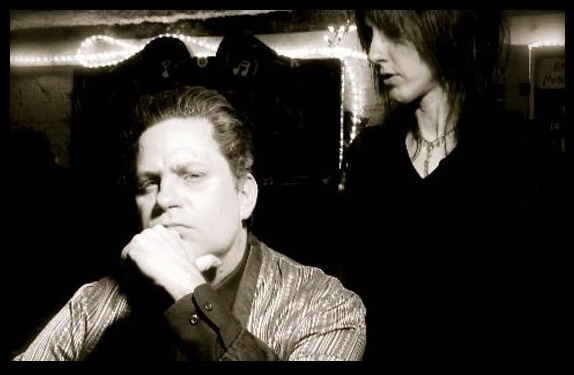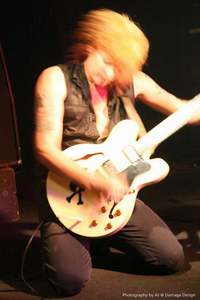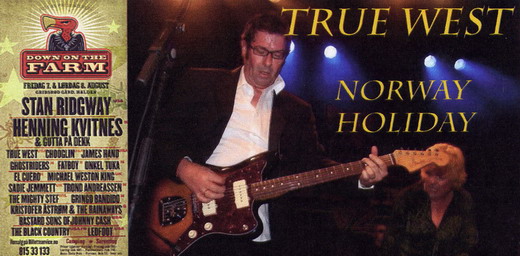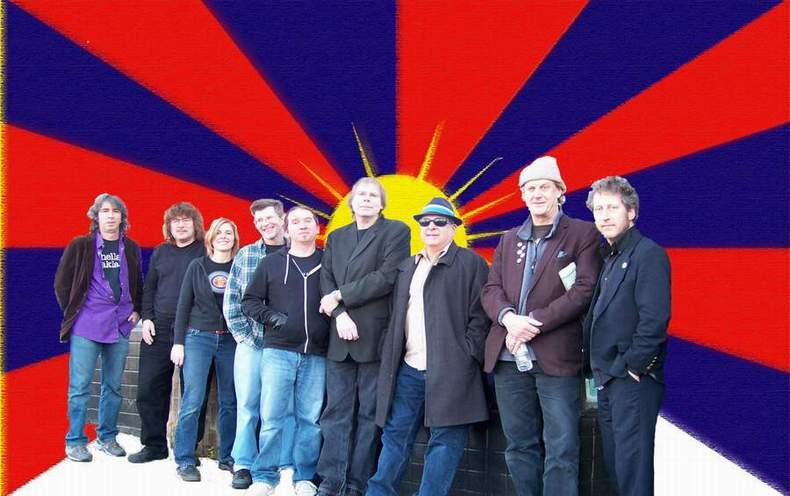Tim Lee 3: A New Kind Of FunOctober 1, 2009

The latest album by the Tim Lee 3 may be tagged ‘Southern rock” by some listeners. And while I agree that it DOES go down particularly well with BBQ, slaw and a couple of beers, and that there will always be a vein of Mississippi mud surging thru the power chords, the music that Tim, his wife and bassist, Susan Bauer Lee and drummer Rodney Cash are making these days also mines the rock of Mott the Hoople, Free, The Faces, New York Dolls and John Doe & Exene of X. Plug & play, go-for-broke rock & mayhem. By now, the trio are cooking up a singular feast that has been slow cookin’ for many years and just gets better with each new serving. Earcandy Archive talks with Tim & Susan about their timeless recipe.
Wherever you turn nowadays, you’re liable to bump into a band tagging themselves roots or Americana. Maybe it helps sell cds amidst a downward spiraling market but its just not a dress you can throw on to go play the gig. It takes more than slapping on a mandolin solo and doing a Levon Helm impersonation. And, anyway, back in the day, most ALL rock music was “roots music” – it was based on the blues, after all. So the current penchant for backwoods harmonies and boot stompin’ swagger is a mite confusing…oh brother, where art thou dobro, thy zither, your CSNY harmonies? But I digress…
My advice to genre-hoppers is to look toward Alejandro Escovedo, Steve Wynn, Chuck Prophet, Don Dixon and Tim Lee …just to name a few musicians who’ve carved out careers writing great songs, playing them honestly and honing their craft. After a couple of decades plugging in, they are beyond genre, all their own and getting stronger with every album. The musicians are at the service of the song. Not wearing a musical style like a tourniquet.
The latest album by the Tim Lee 3 may be tagged ‘Southern rock” by some listeners. And while I agree that it DOES go down particularly well with BBQ, slaw and a couple of beers, and that there will always be a vein of Mississippi mud surging thru the power chords, the music that Tim, his wife and bassist, Susan Bauer Lee and drummer Rodney Cash are making these days also mines the rock of Mott the Hoople, Free, The Faces, New York Dolls and John Doe & Exene of X. Plug & play, go-for-broke rock & mayhem. By now, the trio are cooking up a singular feast that has been slow cookin’ for many years and just gets better with each new serving. Earcandy Archive talks with Tim & Susan about their timeless recipe. Joining us is a “query by his peers” from Steve Wynn, Matt Piucci, Pat Thomas, Russ Tolman, Don Dixon, his label honcho Jim Huie and his bandmate from The Windbreakers, Bobby Sutliff.
When Concrete Dog was released, I said it was a career best, but you’ve managed with “Good2B3” to hit another homerun. After 27+ years making music, that’s saying a lot! What’s your secret? Snake oil? Alligator Wine? Dr Bonner’s Miracle Rub?
Tim: All of the above. I guess I really don’t know, other than you just have to keep trying to outdo yourself. The more I do this, the less I look back at what I’ve done in the past and the more I focus on the present (and the future). I really don’t feel like I’ve been doing this for so long, so every new thing tends to be pretty exciting.
You took a hiatus from the music industry during much of the ‘90’s. Were there changes in the industry & the live circuit that just made it no fun anymore? What sparked your return with “Under The House” back in 2003?
Tim: I was just exhausted from beating my head against a brick wall for so long. As for the changes in the biz, it was becoming less viable to do things the way I’d been doing it. Independent labels were being snapped up by the majors, and so many of the people who’d helped build the indie scene were becoming more mainstream in their business dealings. If it hadn’t been for folks like Danny Beard, Bob Lawton and Steve Fallon, I probably wouldn’t have lasted as long as I did the first time around.
My getting back into this started with a little curiosity from myself, a bunch of encouragement from some local Knoxville musicians (John T. Baker, Jim Rivers) and the inspiration of Susan picking up the bass. From there, it just snowballed.
The new album is clearly a Tim Lee 3 effort with you both sharing the vocals & songwriting. And, with Susan & Rodney providing a bed-rock rhythm, Tim is given free rein to let loose his most fiery guitar leads yet. Playing live, y’all seem to be breathing as one. Even the new album is mostly done live in the studio, right? I’m guessing you are having the time of your lives…
Tim: Yeah, we did all the basic stuff live, then overdubbed a few things. I’ve made records pretty much every conceivable way it can be done, but playing live in the studio is probably the most fun. It’s not always practical, either because of the facility or the players, but when it works, it’s pretty magical. Playing with Susan provides me with a lot of joy. She loves to play, and it reminds me constantly of what I love about playing. Thanks for the comments on the guitar playing. That part of the recording process was pretty effortless because we had good basic tracks to work with.
What made you head off to Tucson to use the Wave lab Studios for the latest album?
Tim: Susan and I have gotten to know Wavelab owner Craig Schumacher through TapeOp and stuff. Susan does a lot of graphics work for Craig. And it’s always fun to get out of your natural element for recording. If you’re recording in your own town, there are usually a lot of interruptions or somebody’s got to leave for a while to go feed the dogs or something. Wavelab has a great vibe and everybody there’s a lot of fun to work with. Plus we went during winter, so we got to dodge the cold for a while.
I have to say, Susan, that you are one of my new heroes….you’ve been a graphic artist & photographer for years, and then, one morning, you wake up to the epiphany that you wanted to learn how to play bass guitar. Tim has said that you can do anything you put your mind to…I gather you didn’t want Tim to have all the fun?
Susan: I’ve actually enjoyed Tim’s music career from the sidelines all these years anyway…. I reckon playing is just a new kind of fun. Aside from that, I think I can say that when the band is playing together, whether practice or a show, I feel more alive in those few hours than any of the remaining 22 or so hours in any given day. I think because of that feeling, it just made it easy. Kinda like how I assume feeling high makes it easy for one to do drugs. Playing in a raucous r’n’r band is my drug.
Don Dixon gave me this question to ask you both: “I think that SUSAN has become a remarkably good bass player in what appears to be a very short period of time…when SUSAN decided to play an instrument, how did she acquire her skills so quickly? I’m asking you both because i think it’s hard sometimes for the individual to see the process & maybe TIM will have some additional insight…”:
Susan: Aw, hell. For Don Dixon to say something like that about me? Well, that’s just about the sweetest thing. (you have to hear that line with a very distinct southern accent)
Tim: She’s got a gift, plus I think it helps that she went straight to the instrument, as opposed to being a guitarist first. The first time she picked up a bass and was shown a few notes and started playing along with a record, she immediately fell in with the kick drum, not the guitars.
Susan: I think Tim’s right; having gone straight to bass, I don’t feel the need to throw in “guitar licks” or do a bunch of fancy noodling because that’s not what I do… that kind of playing just doesn’t fit the kind of songs I like to play. And the song is always more important than me. My place as a bass player is a sonic bridge between the kick drum and the guitar. You hear me when you’re supposed to….. gently cupping the bottom.
At some point, Susan, you started giving lyrics to Tim to look over, and “Concrete Dog” has great songs from that collaboration. By the new album, all of the songs are credited to you both jointly. How has that creative songwriting process evolved?
Susan: that was the one thing that I was actually a little shy about. Songwriting was a whole other level of exposure that takes some getting used to. For all I knew, all those words I was stringing together was crap. But when Tim combined them with music or other words, well …. I’ll be damned…. that’s a song.
Tim: The process is different from song to song. We’ve made up songs by trading lines while driving down the highway,; I’ve scavenged lyrics out of her notebook; she’s come in with ideas fully formed and I just helped with the music part. I can’t not write songs; it’s just something that happens whether I want it to or not. Having Susan’s input helps a bunch, whether we’re working from her ideas or she’s just helping me edit and refine my own.
Years ago, Tim, you co-wrote quite a few songs with Sherry Cothren; was that a similar process?
Tim: When I worked with Sherry, she would just give me notebooks of material. She wrote like a fiend, so I learned to glean inspiration to come up with music from her words. That happens a lot with Susan too.
Since moving there in the late ‘90’s, you both have sunk deep roots in the Knoxville scene, gigging often and even playing on local artists’ albums.
Tim: I’m not any good at sitting on anybody’s sidelines very well. I have to be knee-deep in whatever I’m into. In addition to our band’s activities, I’m currently working with former Judybats singer Jeff Heiskell on his upcoming solo disc, and I’ve co-produced some sessions for a young band here in town called Cold Hands. I’ve also helped Jake Winstrom, the lead singer-songwriter in my favorite young band, the Tenderhooks. I get occasional calls for session guitar work, which is usually a challenge I really enjoy.
On the new album is a song, “The Bridge”, a tribute to the writer Larry Brown, now sadly deceased. Tell us about Larry and of the tribute project you coordinated called “Just One More”. Has his writing influenced any of your songs’ subject matter?
Tim: Larry is absolutely an influence. He’s probably my favorite all-time author, and he was a great guy who loved music and musicians. When I was driving home from his funeral, it occurred to me that a musical tribute would be the most appropriate, so I went to work on it. He had a lot of friends and fans, so it was pretty easy to come up with a list of great artists such as Alejandro Escovedo, Greg Brown, North Miss. Allstars, Bo Ramsey, Vic Chesnutt, Jim Dickinson and others. Everybody who was asked directly was very enthusiastic, so it came together pretty quickly.
What record did you hear years ago that made you say: “Man, I have got to learn how to play guitar”?
Tim: When I was a kid, I would take my brother’s copy of “The Best of Cream” and lift the needle over and over to hear the Leslie-powered guitar break that George Harrison played on “Badge.” Neil Young’s intro to “Ohio” had the same effect (it was funny to later find out that both of those parts are three simple chords). When I started playing, I spent a lot of time listening to ZZ Top’s “Tres Hombres,” Wishbone Ash’s “Live Dates,” Mountain’s “Nantucket Sleighride,” Mott the Hoople’s “Mott” and anything with Mick Ronson or Paul Kossoff on it.
Jim Huie (of the Paisley Pop label) asks:
Do you have any musical guilty pleasures — songs or bands that ideologically
or stylistically you should hate, but can’t help enjoying listening to when they come onto the radio. Also, who are your musical heroes, even after all this time, no matter what sort of dumbass missteps they’ve made along the way (Neil Young? Paul McCartney? ZZ Top?).
Tim: There’s nothing I feel guilty about liking. I hear stuff on the radio all the time that I like, but I tend to get tired of those confectionary pleasures pretty quickly. I think the people I appreciate the most, the Neil Youngs, John Fogertys, Bob Dylans and Billy Gibbons of the world are actually more lovable for their faults. I don’t know of many artists who haven’t had their missteps somewhere along the way.
The funny thing is that I’m not really a huge music fan these days, in that I don’t run around worrying about new releases much. I don’t really buy too many records (I figure my head is packed plenty full of music from the past four or five decades), but I hear a lot of radio, although I rarely know what I’m hearing. Most of the musicians I know around here spend a lot of time listening to music. I’d rather spend that time being involved in music. Besides, I’m really just lazy about that stuff. However, I do pay a good bit of attention to the records that my friends make. I get a bigger thrill out of hearing great music from the people I know than some more famous person.
Pat Thomas (of the bands Mushroom and Absolute Grey) asks:
the first round of Southern Rock was the Allman Brothers, Lynyrd Skynard, etc, – the next round was REM, Let’s Active, Windbreakers, etc – although the musical differences are great – what, if any, is the connection between those two very different eras and styles of Southern Rock ?
Tim: It seems to be a commonly held belief that the second wave was a reaction against the first one, and there’s probably some truth to that, although it’s not that simple. To me, I always looked to what people like Mitch Easter and the dB’s were doing as the impetus for a lot of us who followed close behind (as they probably would point to the inspiration of Big Star in Memphis). Still, there were a lot of little pockets of things popping up on their own in Atlanta, Athens, Nashville and other places. Once those scenes learned of the other ones, there was a lot of interaction between them. Maybe it’s a bit of a stretch, but the connection I see between the two is just a sort of dogged Southern attitude, what writers probably call something like “rugged individualism.” But that needs to exist for any music form to survive and thrive. I find the newest wave of “Southern Rock” pretty interesting, because I’m willing to wager that the members of the Drive-By Truckers probably had as many REM records as they did Skynyrd ones.
Russ Tolman (of the band True West) asks:
Your father is a southern Christian leader. What was it like at home when it became clear that your calling was playing “the devil’s music”? Was it ever an issue?
Tim: Not really. My father was always the kind of guy who would encourage you to find your own path, albeit in a subtle fashion. My mom, Dot, was definitely more high-strung about these matters, and while the issue of the “devil’s music” never came up, she was certain there were better career paths out there for a young man.
Matt Piucci (of Rain Parade) asks:
What was it like having the FBI living at your house when you were a kid. I understand your Dad, the Reverend Clayton Lee, was an outspoken anti-segregationist, who received death threats from various racist hillbillies around Jackson.
Tim: My father, Clay Lee, was a young Methodist minister in Philadelphia, Miss., during 1963, the year that Goodman, Chaney and Schwerner were murdered while working as activist that summer. He was not a real activist or anything, just a preacher who spoke what he believed despite how unpopular that kind of thing was back then. I was very young, but I recall a guy we called “Uncle Phil,” who hung around all the time. Later on, I found out that Phil was an FBI agent keeping a close eye on our family because of the death threats my dad received. There were members of his own congregation who fought hard to get “that communist” run out of town. Clay’s a great guy, and definitely one of my heroes.
Steve Wynn (of the Miracle 3, Smack Dab, The Baseball Project & Dream Syndicate) asks:
After touring the South with you for a few days I felt a special insight to road dining below the Mason-Dixon Line. But now that I’ve earned your trust (sharing a van for hundreds of miles will do that) you have to come clean. Where is the best BBQ that you’ve ever had on tour. C’mon, compadre. Tell me. My lips are sealed.
Tim: Your lips won’t stay that way when you come south again…. We often joke that we don’t play the “chitlin’ circuit,” but that we work the “pulled pork circuit”. Among our top stops on the road are Prissy Polly’s in Kernersville, North Carolina, which is very convenient to Mitch Easter’s Fidelitorium Studio. Payne’s Barbeque in Memphis has the hands-down best pork sandwich I’ve ever eaten, topped with this wild mustardy slaw and that fine sweet, spicy sauce Memphis ‘que is famous for. We’d also be remiss not to mention White Lightnin’ Barbeque in Macon, Georgia. Owned by a couple of the members of the excellent band, Hank Vegas, the White Lightnin’ features great food and a Burt Reynolds decorative motif. They recently told us they were adding a beef, pork and chicken combo plate to the menu called the “Tim Lee 3!”
Bobby Sutliff (of The Windbreakers) asks:
If you were only allowed to use one of your 56 effects pedals – which one would it be?
Tim: That’s like asking me to choose between my children (Susan: WHAT CHILDREN?), besides I’ve recently unloaded a ton of pedals. My current fave is the Barber Tone Pump, despite its awkward design.
Mitch Easter (of Let’s Active & hotshot producer) asks:
When did Tim invent the dual-shirt scheme. I don’t think I have ever seen him, in any kind of weather, not wearing two shirts. Like, I can’t picture him wearing just a T-shirt, even when it’s 100º
Tim: It occurred to me a few years ago that I basically dress the same way I did in the 8th grade. The only differences are that my blue jeans no longer sport elephant bells and my denim shirt doesn’t have a large Mickey Mouse screen-printed on the back.
A question for Susan: what’s the significance of wearing one silver star?
Susan: HAHAHAHAHAHAHAHA actually, I wear one of all my earrings because whenever I wear a matching pair, I always lose one of them….never fails. The star thing just kinda happened accidentally, but I finally lost that earring, which was a very sad day, indeed.
A question for Falstaff, Scooter & Stella: (Tim & Susan’s Bassett Hounds) :
all this rock ‘n’ roll…….good times? Or infernal racket?
Falstaff: woof! woof!
Scooter: a-wrooooooo-oooo-ooo!
Stella: Arf! Arf! Arf!

 "But I Can't Let It Go" (further reflections on The Church)
"But I Can't Let It Go" (further reflections on The Church) Barman Says:
Barman Says: Subscribe to comments
Subscribe to comments  More headlines from
More headlines from 












